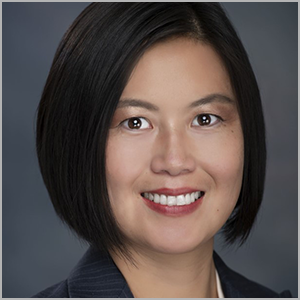- BLOG HOME
- »
- StudentTracker for High Schools
- »
- Using Data to Empower Lifelong Learning

Using Data to Empower Lifelong Learning
 An Interview with Dr. Zhewei Gregory, Managing Director for Research Development and Philanthropy, National Student Clearinghouse
An Interview with Dr. Zhewei Gregory, Managing Director for Research Development and Philanthropy, National Student Clearinghouse
National Student Clearinghouse: In January you started working at the Clearinghouse. What informed your decision to join us?
Zhewei Gregory: In my most recent position at Georgia State University (GSU), I served as executive director in the Office of Senior Vice President for Student Success. At GSU, I was also a University Innovation Alliance fellow, where I oversaw the national Completion Grant program. In these roles, not a day passed that I wasn’t looking at data from the National Student Clearinghouse.
So, I was very familiar with the Clearinghouse and its national impact on education and student success. When I learned of the opportunity to work here, I thought this would be a great avenue to use my experience to help the Clearinghouse meet the data needs of those in the post-secondary education field.
Clearinghouse: You also spent time at Wake Forest University. Can you tell us about your time there?
Gregory: As the Research Director at Wake Forest, my primary role was to advise graduate students in research and throughout their careers. There, I realized there was a big gap between the skills students were learning and what was needed in the industry post-graduation.
This highlighted, for me, the importance of continual learning after graduation, which is something that the Clearinghouse advocates for and encourages. So, it’s not just about completing the college level or graduate degree but also bridging the gap between the skills learned in higher education and those needed in the job market.
Clearinghouse: What are your goals for the Clearinghouse’s custom research services?
Gregory: In my role as Managing Director for Research Development and Philanthropy at the Clearinghouse, I’ll be leading the way to create a brand-new business and service vertical where we provide customized research and data services to a broad range of clients and partners while managing the valuable relationships with foundations.
Clearinghouse: Why is it essential for the Clearinghouse to evolve its research services?
Gregory: We’re at a pivotal point in the higher education industry where only looking at traditional data collection points, enrollment, completion, progression, etc., doesn’t fully address the needs any more. Instead, we must look at data that measure the long-term success for learners, such as job placement, income, post-school credentialing, social mobility, and more.
Clearinghouse: Why is data collection and analysis critical to higher education institution decision-makers?
Gregory: Data collection and analysis provide decision-makers with evidence to validate programs and initiatives. For example, when I worked at GSU, the administration analyzed data from past decades to determine what programs were needed for student success. They found that they needed to address the financial gap for students, so those who needed additional financial support could stay enrolled.
As a result, the Panther Retention Grant program was created to identify students based on their credits, financial needs, and enrollment status. Recipients of the grants received money directly into their accounts to continue their education and graduate. Such a program could not have been built without data evidence. This program is now a national model.
Clearinghouse: Switching to your other role, why are philanthropic partnerships critical for the Clearinghouse?
Gregory: The philanthropic grants allow us to research critical issues facing higher education, such as equity, changes in enrollment patterns, or the pandemic’s impact on college completion rates.
Clearinghouse: Why is it important for these foundations and government agencies to work with the Clearinghouse? What is in it for them?
Gregory: We are at the point where foundations, government agencies, states, and institutions realize it’s time to assess the state of higher education and join forces to work together. The Clearinghouse’s research services provide actionable insights that help inform the decision-making of foundations and the government.
For example, workforce development is a big trend, and a lot of money has been invested in this area through government grants. The government can use our research services to assess what industries and populations need the most help.
Clearinghouse: Why should employers care about what is happening in education?
Gregory: Simply put, employers should care about the education space because that’s their workforce pipeline. Employers should consider themselves as an essential partner in education-to-workforce continuum that can help address critical workforce skill gaps.
Clearinghouse: We see in the news how the pandemic has impacted students and institutions. Why is it important for the higher education community to stay better attuned to trends?
Gregory: I think the pandemic served as a change agent for higher education. Education institutions were put on the spot and had to make changes to survive. The pandemic also made institutions look hard at the trends regarding course offerings, financial aid, and other support services to ensure students have the tools to succeed.
Clearinghouse: What should the high school community know about the Clearinghouse’s research services?
Gregory: The Clearinghouse’s research services can help academic leaders track student success, identify at-risk students, and enable school counselors and others to inform students on the ROI for higher education, best choices for post-secondary education, and career pathways. High school administrators should consider using our StudentTracker for High Schools and DiplomaVerify services and review our case studies to help their institution support students.
“I’ll be leading the way to create a brand-new business and service vertical where we provide customized research and data services to a broad range of clients and partners while managing the valuable relationships with foundations.”
Dr. Zhewei Gregory
Managing Director for Research Development and Philanthropy, National Student Clearinghouse
Additional Resources:



